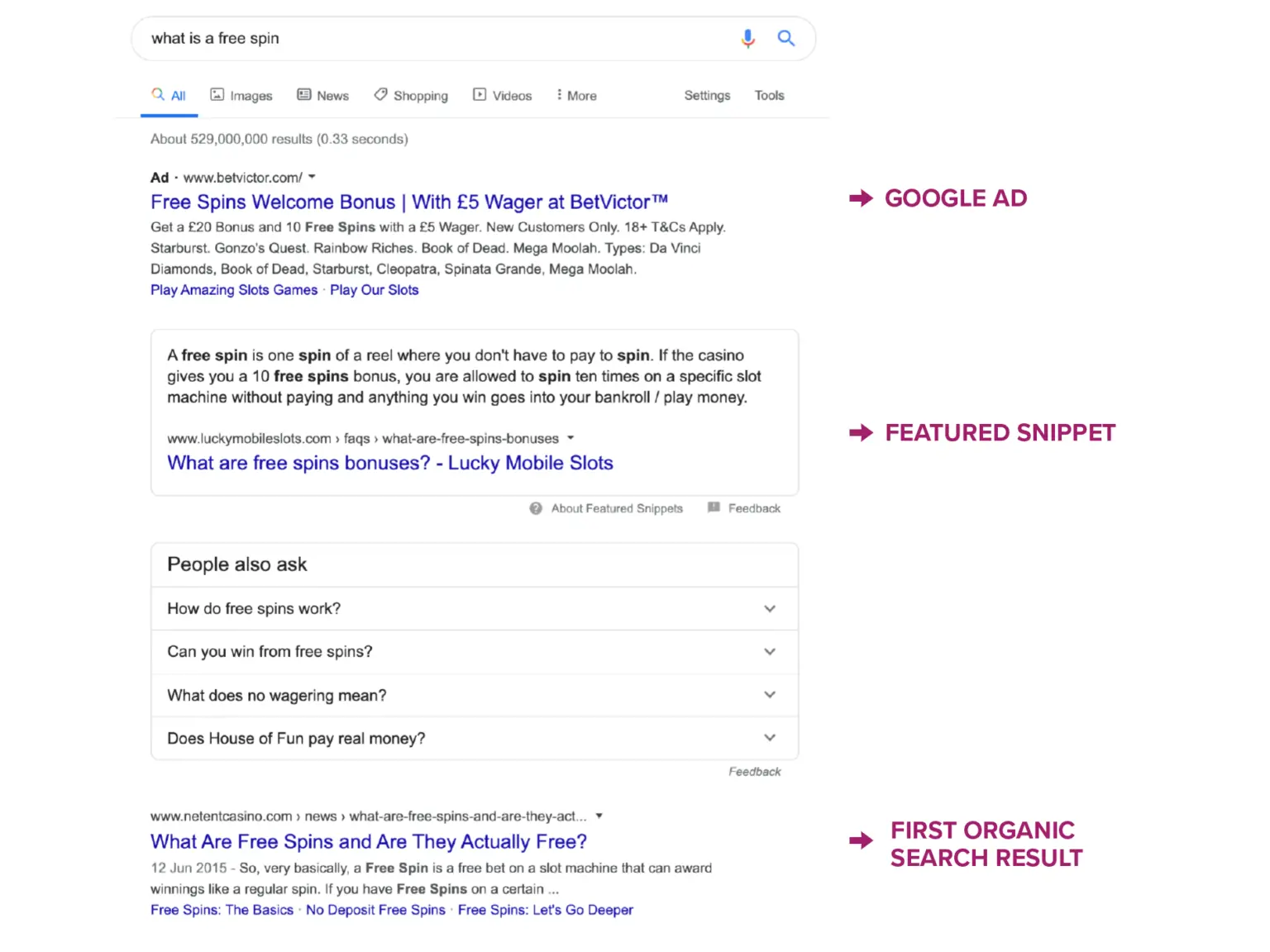To affiliates which have thrived based on superior SEO, it can feel more than a little unfair to be displaced by ads, and potentially for their content to be used directly on the page by Google.
With 40% to 50% of searches presenting zero-click results, just how troubling is the situation for affiliates? Well, according to some of the latest research, the future is brighter than anticipated.
In a recent study, Perficient Digital found that the click-through rate for search engine queries that presented answers to the user in the form of featured snippets (shown in the examples on p26), click-through rate is actually higher on average.
However, that phrase “on average” is a critical aspect of this for affiliates.
While some finite queries can and will be resolved with a very clear featured snippet, it’s our observation at ICS-digital that other types of queries are the ones that actually drive quality traffic – and the two main types for affiliates to be aware of are as follows:
● Web searches that show intent to uncover authoritative and/or entertaining long-form content.
● Web searches that show an intent to research and evaluate multiple options or perspectives.
With these types of content, the goal for affiliates should be to continue to produce high-quality, in-depth content that is optimised for the reading enjoyment of players, while also providing succinct elements that can easily be scooped up by Google and presented on the SERP as an answer to a user query.
For time-starved marketers and igaming SEO managers, it’s just not possible or desirable to pursue featured snippets that answer finite questions that don’t drive traffic. For such searches, users just want the answer and don’t care about the brand providing the answer – and Google will give no thanks.
In this case the focus should be on highly readable long-form guides, reviews, previews, opinion pieces, exclusive interviews and more – all optimised for search, with Schema mark-up where appropriate and with digestible content that will give at least half a chance of being pulled into a featured snippet.
We fully expect Google to continue down this track, adding more featured snippets, carousels and local packs, coupled with an ever-increasing focus on paid advertising.
For affiliates, PPC can be a highly effective but costly proposition – and there’s absolutely no need to be forced down this route.
As the most recent research has shown, featured snippets and other Google initiatives do not mean that users won’t click through – they just need a good reason to.The ICS content team’s advice to our clients – and that includes both operators and affiliates – is to prioritise content that adds value, so that even if Google presents a tidy answer to the user, they have a reason to click through and read more.
Managing your time to produce more of this content, in all of the languages and markets that you operate, will see greater rewards than trying to target anything and everything, or trying to achieve a ‘vanity metric’ of becoming the featured snippet for a high volume but low-converting search term.
In the current climate, with concerns over where to allocate marketing time and investment due to the coronavirus, the latest data tells us that limiting activity around search or content due to the rise in zero-click searches is the wrong way to go. Steps must be taken to prioritise and optimise for players as well as search engines, however.
BEYOND FEATURES SNIPPETS AND ZERO-CLICK
Long-tail searches (search terms that are more specific and usually encompass more variables) are ones in which Google will be challenged to present featured snippets that fully encompass the answer that a searcher is looking for.
More than this, the more specific a query, the greater the opportunity (usually) for an affiliate site to provide an in-depth answer that informs, engages and drives action.
In this sense, traditional search goals – such as ranking first, with the user having to click through to get the answer they’re looking for – will continue to be massively important for affiliates.Without the large teams and deep pockets of operators, affiliates can most effectively compete by going deeper with their SEO and content strategies, and putting in the work to rank for long-tail searches that show intent to play.
Those with a long-term perspective will go one step beyond, and develop their brands and user experience so that rather than pinning hopes on a first visit transitioning into a first-time depositor (FTD), repeat visits becomes the norm – along with recommendations, shares and social buzz.
Quality content is at the heart of this brand-first approach – and that brings us back around to where we started and the machinations of Google.
Google seems to reward brands – and companies who have the attributes of brands – with higher search rankings than they might deserve.
Investing in high-quality content, user experience and everything from an engaging tone of voice and brand personality through to brand-boosting initiatives such as influencer marketing and sponsorship will become more widely recognised as key aspects of competing in search engine optimisation.
In short, there are more opportunities to capitalise on than there are genuine worries about zero-click searches – but affiliates must be bold enough to take the opportunities in front of them.


